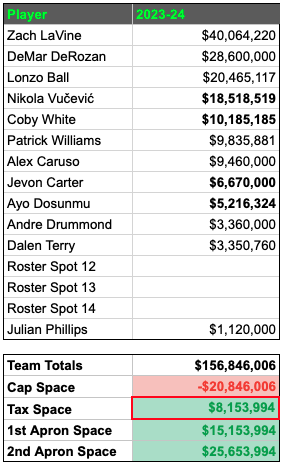© 2026 ALLCITY Network Inc.
All rights reserved.

There’s nothing the Chicago Bulls organization loves more than bringing home one of its own.
That’s exactly what they did 34 minutes into Friday’s free agency period, signing former Milwaukee Buck and Proviso East product Jevon Carter, 27, to a three-year, $20 million deal.
I have to say, this was much better news than I anticipated from the Bulls in free agency.
Coming to the Bulls following a breakout season in Milwaukee in 2023, Carter averaged 8 points, 2.5 rebounds and 2.4 assists per game. Not the flashiest numbers, until you scroll down to the 42.1 percent number on 4.2 attempts from behind the arc.
Though he doesn’t address the Bulls’ need for size and length, the 6-foot-1 Carter is a dogged point-of-attack defender, whose 1.3 defensive Estimated Plus-Minus (EPM) ranked in the 88th percentile of the entire NBA.

The Bucks had the fourth-best defense in the NBA, yet they performed 2.9 points per 100 possessions better on that end with Carter on the floor compared to when he sat.
Even known as a defensive player, Carter has the potential to elevate the Bulls offense just as much.
Adding Carter’s shooting will be a huge boon for the Bulls’ offense. His 337 total three-point attempts would have been the fourth most on the Bulls last year, despite playing only 22.3 minutes per game. He would have had the second most three-point makes.
Carter can do it off the dribble (39.3 percent on 1.7 attempts per game) and off-the-catch (43.9 percent on 2.4 attempts per game) last season. For the team who finished dead last in three-point attempt rate, he will immediately slot in as one of the team’s best shooters.
Even though he is nominally a point guard, Carter is not a passer or playmaker, and will operate best flanking the Bulls trio of former All-Stars. He is effectively a 3-and-D one, who will defend the better of the two back court players and knock down open shots.
Carter fits the mold of a defensive ace, who can shoot it, but isn’t ball dominant. That’s a tried and true formula as far as tried and true formulas go for the Bulls. After all, the Bulls were famously first in the East before Lonzo Ball got hurt in 2021-22 and finished the 2022-23 season on a 14-9 stretch.
Jabs aside, I really do think Carter makes the Bulls better. He will secure a scary defensive front alongside Alex Caruso, add shooting to a team in desperate need and adds much needed depth.
And he’s just entering his prime.
Similar to Nikola Vucevic and Coby White’s deals, this one is a solid value in a vacuum. John Hollinger projected Carter to be worth $9.4 million annually, though he expected something closer to the bi-annual exception ($4.5 million). Stephen Noh’s simple salary tool pegs him as an $11.4 million player.
There’s certainly something to be said for having moveable contracts up and down the roster (mostly down, the guys on top…not so much). To get Carter using half of the mid-level exception is a very solid piece of business for the Bulls, especially if he slots in as the team’s starting point guard.
Carter answers some big questions, but not all of them. To be fair, no one player on the market could have. Especially if their goal is to avoid the luxury tax, which appears to be the case yet again.
After locking in Carter, White and Vucevic, the Bulls cap sheet is coming into focus. While we wait to see what happens with Ayo Dosunmu, there’s not much space left to fill out the roster.

Let’s say the Bulls use veteran minimums on two of the remaining three spots, they could get up to about $4 million using the Bi-Annual Exception.
They’ll need to add size, shooting and facilitation with their remaining free agent dollars.
Considering the limitations, it’s not a bad outcome.
But as a reminder, those limitations are self-fulfilling. They don’t have to hard cap themselves at the tax line. They could have spent their way into a higher stratosphere if they were as confident in their core as their actions suggest they are.
There was a world where the Bulls snagged Carter using the Bi-Annual Exception, then used their full Mid-Level Exception on Grant Williams or Max Strus or PJ Washington or Donte DiVincenzo or Dillon Brooks or Kelly Oubre or Christian Wood. They could have done so while evading the 1st Apron, where things start to get punitive.
But going into the tax wasn’t a priority despite Arturas Karnisovas insisting it was a possibility for a top-six caliber team.
They could always do more. They could always do better. And while I still disagree with picking this direction, the Bulls got a very solid player on a very solid contract.
You have to credit the front office for finally adding a productive piece that can help their group come closer to their potential.
Get Chicago's Best Sports Content In Your Inbox!Become a smarter Chicago sports fan with the latest game recaps, analysis and exclusive content from CHGO’s writers and podcasters!
Just drop your email below!
Comments
Share your thoughts
Join the conversation



